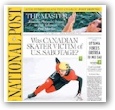A blow to diplomats, not peace
- FATHER RAYMOND J. DE SOUZA
The diplomatic class and their labours are necessary for the work of peace and international order.
 Yet diplomats also have a weakness, namely to value the reaching of an agreement itself over the purpose the agreement is intended to achieve.
Yet diplomats also have a weakness, namely to value the reaching of an agreement itself over the purpose the agreement is intended to achieve.
Hence the widespread handwringing — in some places hyperventilating — over President Donald Trump’s decision to withdraw from the Iranian nuclear agreement and reinstate economic sanctions on Iran.
The proper debate is whether the Iranian nuclear deal is/was an effective means to prevent Iran developing nuclear weapons. It is a fair criticism of the Obama administration that its eagerness to achieve a diplomatic agreement meant that the content of the agreement became secondary. And last week’s Israeli revelations of Iran’s nuclear secrets underscores the perennial risk of making treaties with tyrants. Will they keep their word? And if they don’t keep their word, are the states who make agreements with them fools?
That is more or less the position that America’s allies in the region, Israel and Saudi Arabia, took on the Iran nuclear deal. America’s president now agrees.
In that context, it is useful to remember diplomatic deals, hailed at the time, which did not achieve what they intended. Consider two examples.
The American-Cuban rapprochement and re-establishment of diplomatic relations was a genuine diplomatic breakthrough. I was inclined to agree at the time; after all, the 50-year American policy of embargo and isolation had not succeeded in relaxing the grip of the Castro brothers on the throat of the Cuban people. So why not try engagement, employing the carrot instead of the stick?
The American-Cuban agreement did allow for greater mobility for Americans, and for money transfers and investment for business. It did not, however, lead to greater liberties for the Cuban people. Indeed, in the year after the agreement there was a tightening of restrictions on political dissidents and religious believers.
Diplomats’ successes ought not be judged according to their ideals, but their results.
A second diplomatic example, more relevant to nuclear proliferation, is the Budapest Memorandum on Security Assurances. It was signed in December 1994 and addressed the question of what was to be done about the Soviet-era nuclear stockpiles in the newly independent states of Ukraine, Belarus and Kazakhstan. The memorandum was signed by the three states and three nuclear powers: Russia, Britain and the United States. Later France and China also gave their assent.
But it is also true that advances for diplomacy can be setbacks for peace and order.
The essential deal was this: the three states would give up their nuclear stockpiles in order for international assurances that their territorial integrity and political sovereignty would be respected. In effect, Ukraine, Belarus and Kazakhstan were told by the world’s nuclear powers that they could give up their nuclear weapons because they would not need them to defend their territory or sovereignty.
Given that Ukraine had the third-largest stockpile of nuclear arms on its territory then, it was a major diplomatic triumph for nuclear non-proliferation.
But what was that diplomatic triumph worth in 2014, when Russia invaded and annexed Crimea? What is the value of the Budapest Memorandum today, when Russian troops are still present in eastern Ukraine and fomenting destabilizing violence? Neither the territorial integrity nor the political sovereignty of Ukraine, guaranteed by the Budapest agreement, were in fact guaranteed in the event.
In point of fact, the uselessness of the Budapest Memorandum in 2014 marked the practical end of nuclear non-proliferation diplomacy. What actual or aspiring nuclear power — including Iran — would ever really agree to give up its nuclear program in response to international guarantees? Iran tried to get it both ways — to agree to non-proliferation for the sake of relief of international sanction, and to pursue nuclear weapons anyway.
Perhaps Iran’s neighbours — Israel, Saudi Arabia and others — also learned the lessons of the Budapest Memorandum. America and Britain gave assurances to Ukraine but did nothing significant when Russia invaded. What would the international community do if Iran violated its promises? Anything?
The end of the Iran nuclear deal — a painstaking diplomatic work of several countries over many years — is no doubt a setback for diplomacy. But it is also true that advances for diplomacy can be setbacks for peace and order.
 This is Meaghen Gonzalez, Editor of CERC. I hope you appreciated this piece. We curate these articles especially for believers like you.
This is Meaghen Gonzalez, Editor of CERC. I hope you appreciated this piece. We curate these articles especially for believers like you.
Please show your appreciation by making a $3 donation. CERC is entirely reader supported.

Acknowledgement
 Father Raymond J. de Souza, "A blow to diplomats, not peace." National Post, (Canada) May 10, 2018.
Father Raymond J. de Souza, "A blow to diplomats, not peace." National Post, (Canada) May 10, 2018.
Reprinted with permission of the National Post and Fr. de Souza.
The Author
Father Raymond J. de Souza is the founding editor of Convivium magazine.
Copyright © 2018 National Post



